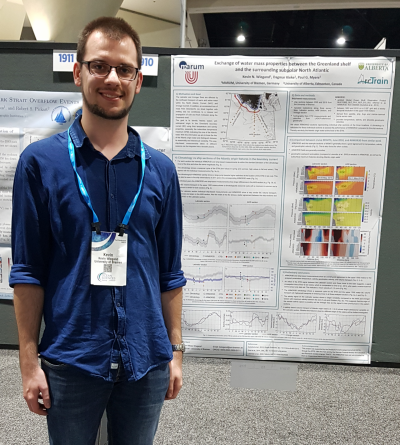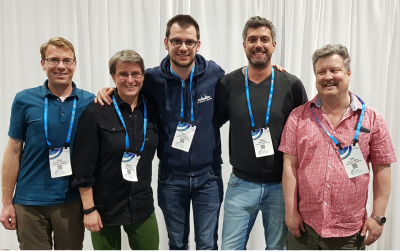- ArcTrain
- Training reports
- Ocean Sciences Meeting 2020
Ocean Sciences Meeting 2020
February 16th - 21st 2020, San Diego, USA
Summary
The Ocean Sciences Meeting (OSM) organized by the American Geophysical Union is known to be the flagship for the ocean sciences. It takes place every two years in the United States. In 2020 the conference was held in San Diego, California, USA, between February 16th and 21st. With more than 6,300 scientists it is the largest conference within the ocean sciences community. From the interactions between the tropical oceans with the warm atmosphere to the interaction between the polar oceans with sea-ice and calving glaciers, the OSM provides the possibility to meet people from all ocean related fields of research spanning all temporal and spatial scales. Combining oral sessions, poster presentations, workshops, open panel discussions, called Town Halls, exhibitions and social activities there are a lot of opportunities to get in touch with other scientists.

The trip to my first conference during my time as ArcTrain PhD-Candidate and my first international conference at all started on Saturday, February 15th 2020 at the Bremen Airport. From there it took us (me, my supervisor Dr. Dagmar Kieke, and Dr. Reiner Steinfeldt, another colleague from our working group) nineteen hours to reach San Diego, California. After adapting to the California time zone on Sunday where we also had the opportunity to explore the city, we visited the San Diego Convention Centre. We registered for the conference and attended the first agenda, a non-formal get-together in the evening. Here, we met with Dr. Vasco Müller (University of Hawaiʻi at Mānoa, USA), a successful ArcTrain Alumni from the first cohort,
whom I first met on a research cruise in 2015, when I participated as student assistant during my Bachelor’s. From Monday onward my days started at 8am with the first oral sessions. On Monday afternoon I was scheduled to present my own contribution to the conference, a poster entitled “Exchange of water mass properties between the Greenland shelf and the surrounding subpolar North Atlantic” within the session “HE14A: Arctic-North Atlantic connectivity: Variability, Changes, and Impacts of Freshwater and Heat Exchange”. During the poster presentation I got a lot of constructive feedback how to deepen and extend my studies, and several new ideas came up for future analyses. Since the posters were allowed to remain on display in the poster hall for the entire week, I was able to present it on the other days when meeting with individual people, as Prof. Paul G. Myers (my Canadian co-supervisor from the University of Alberta, Edmonton, Canada), Clark Pennelly (University of Alberta), and Dr. Igor Yashayaev (Bedford Institute of Oceanography, Dartmouth, Canada). All these discussions resulted in new perspectives regarding different approaches to validate my current results and extent my analyses either with additional Argo data, ship-based measurements, or model experiments. Beside that I attended several oral sessions related and non-related to my own PhD project. I had interesting discussions with other scientists on their posters and got new insights in the topic of data visualization during an open panel discussion.
My personal highlight during the conference beside meeting people with whom a collaboration during my project was discussed was a plenary talk by Dr. Erik van Sebille (Utrecht University, Netherlands) about his numerical Lagrangian tracking tool OceanParcels. He talked about the problems of microplastics in the oceans and showed new ways how science has to be communicated to politicians and the general public in the future.
All in all, attending the Ocean Sciences Meeting was an important personal experience in my career. Discussing my current work and early findings after the first six months of my PhD project was very helpful to get ideas, questions and remarks that I can work on in the following months. This would not have been possible without the support from ArcTrain. Therefore I would like to thank the entire ArcTrain team for giving my the opportunity to have been part of the Ocean Sciences Meeting 2020.
Kevin Wiegand



